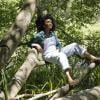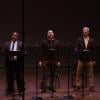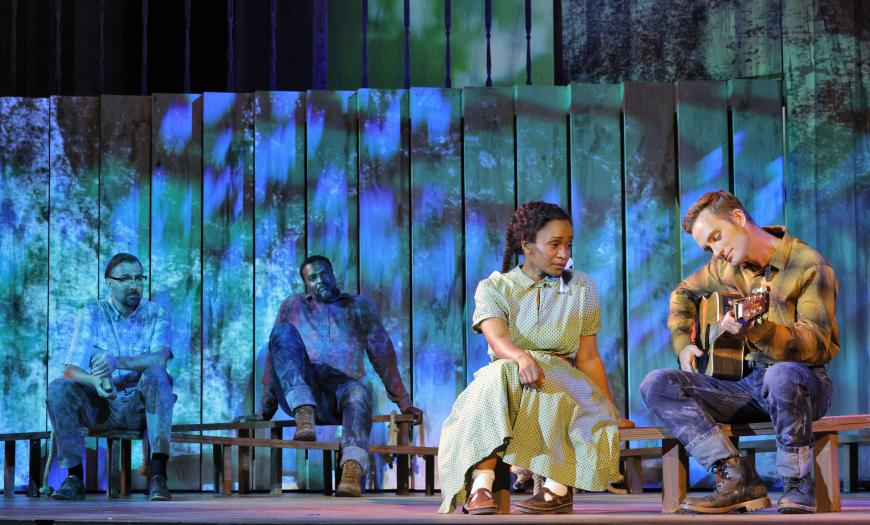
At the center of Eisa Davis’s play Bulrusher, now an opera of the same name by Nathaniel Stookey, is a river — the Navarro River in Mendocino County. As with Moses in the Book of Exodus, the river is the title character’s figurative birthplace. But it’s also her connection to her Pomo Indian heritage: Bulrusher is a clairvoyant, able to “read the water,” to catch glimpses of the future from contact with the river.
Davis’s rich imagery, evocative of myth, is fertile ground for an opera, and her story blends in civil rights history, Boontling (an offshoot of English developed in Boonville, California), and Pomo history as well. West Edge Opera’s world-premiere production, which debuted at Oakland’s Scottish Rite Center on Saturday, gave this new opera the best possible start in life.
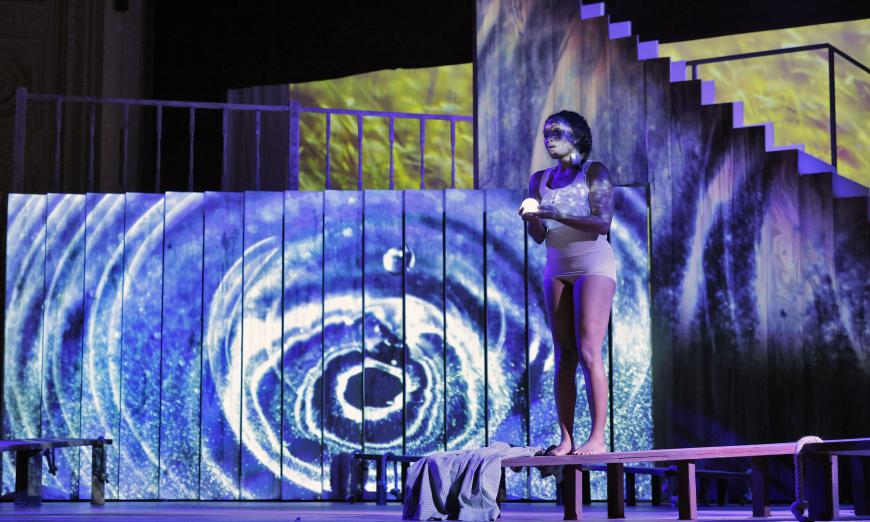
The backstory is that Bulrusher was sent down the river in a reed basket by her mother and was then found by Schoolch, the public-school teacher, who raised her. As Act 1 begins, it’s 1955, and Bulrusher is 18 years old. During a heavy summer rain, she meets Vera, who’s traveled from Birmingham, Alabama, to find her uncle, a local man named Logger, who is the only other Black person, besides Bulrusher, in the town. The love affair between the two women brings secrets to light and, among other things, reveals Bulrusher’s parentage. It’s not hard to figure out the hidden relationships, but then the opera is more about using love to accept one’s situation and deal with it than about plot details. Despite the stormy climax between Bulrusher and her mother, the revelations ultimately heal more than they sting.
Of course, Vera is also from a city that will soon become central in the reinvigorated civil rights movement. She is surprised that her new acquaintance, effectively isolated in a rural, mostly white town, knows nothing of what’s brewing. And because Bulrusher also doesn’t know of her Pomo heritage, she faces the task of learning whole cultural histories as well as resetting relationships that are changing.
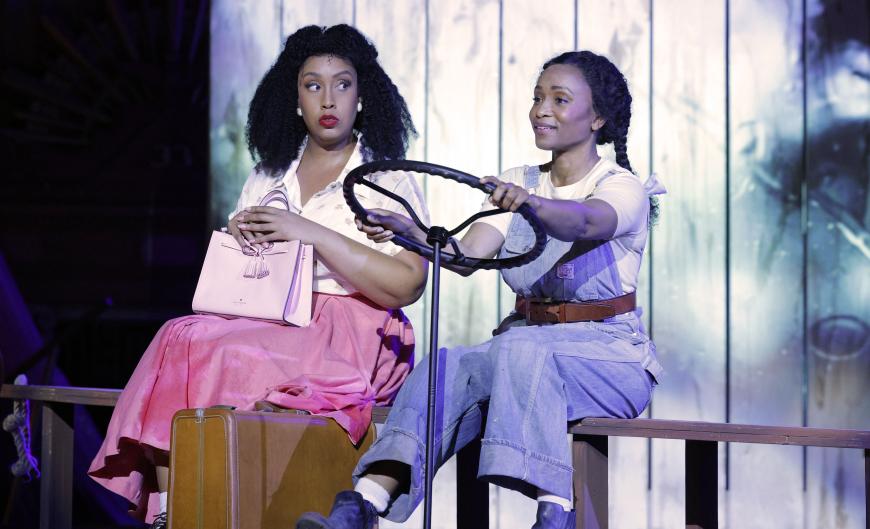
Stookey treats this material with reverent care. His score underlines the text rather than grabbing attention itself, and the vocal lines hew closely to spoken rhythms. A small chorus echoes and amplifies some of what the main characters sing. Occasionally, Stookey, a master of musical styles, throws in a whiff of fiddling or a soupcon of a swinging vamp, but these passages are usually quickly subsumed back into the general texture. There are moments of “Mickey Mousing,” like when the snare drum taps out the rhythm of an old rotary phone being dialed, but the biggest instrumental solos come from the side drum, whose hits add menace to the climactic confrontation.
Overall, Stookey creates an incantatory mood that focuses on the mythic while allowing the music to support the singers in more domestic scenes. The scoring, for 16 instrumentalists, is spare, sometimes only a bass note or sustained harmonies. Of course, there are motives, but they are not foregrounded dramatically in the manner of Richard Wagner or film music. The scoring works particularly well for the Scottish Rite’s acoustic, which does not do well with sustained climaxes or complicated textures. Conductor Emily Senturia handled the music’s delicate balances lovingly and was right there for the cast, cuing entrances and keeping things on track.
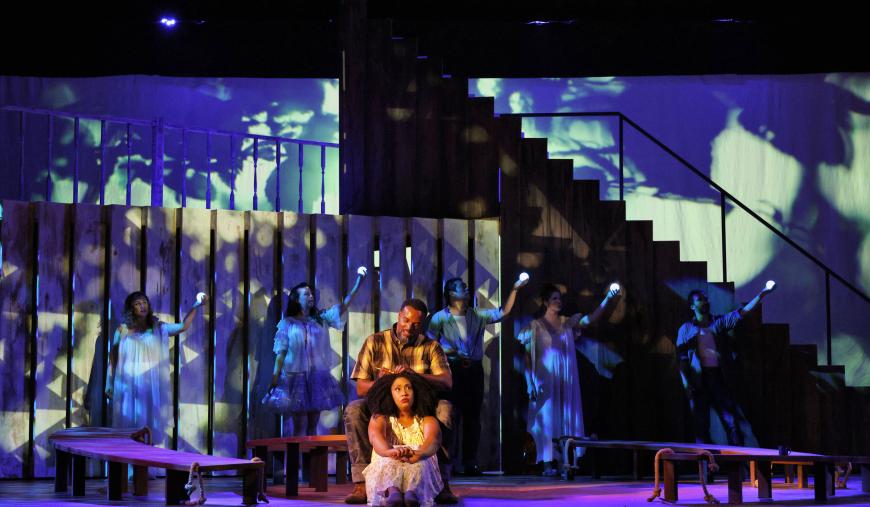
Stookey’s score is powerfully aided by the brilliant and mesmerizing projections of scenic designer Yuki Izumihara. We can hope to see much more of her work because she recently settled in Oakland. NJ Agwuna’s sensitive directing was felt more than seen. She trusted the material and deserves a special commendation for that.
The cast is spectacular top to bottom and would not be out of place at a top-tier North American company. Honors go, naturally, to soprano Shawnette Sulker, who was funny, fierce, and utterly convincing in the title role. Kenneth Kellogg, as Logger, wisely held back his huge bass voice and carried off his character’s mix of louche swagger and tenderness in both sound and movement. As Madame, the brothel owner keeping her fears at bay by imposing iron discipline on herself, mezzo-soprano Rebecca Cuddy was terrific in a very demanding role. Briana Hunter’s Vera was a ray of light, both vocally and in the mezzo-soprano’s acting. Matt Boehler served the character of Schoolch well, with a cavernous bass that Stookey took full advantage of. And Chad Somers was properly annoying as Boy, his supremely confident and clarion tenor making light of the character’s habitual uncertainty.
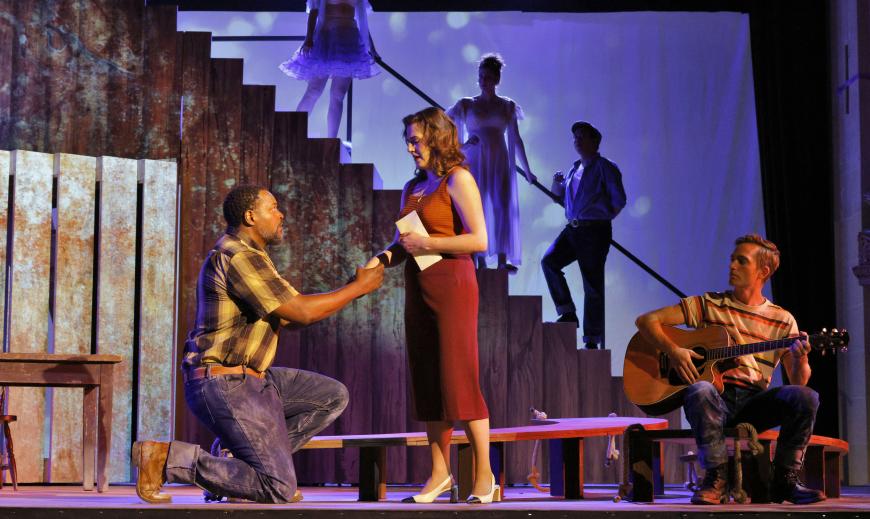
Although this production is so local that it may not transfer to other opera companies, West Edge has once again shown its commitment to doing work at the highest level. As an incubator of viable new opera, it has few peers on the West Coast.
There are two more performances of Bulrusher, on Aug. 11 and 15, in repertory with West Edge Opera’s other two productions this summer, Legend of the Ring and Jacqueline.



